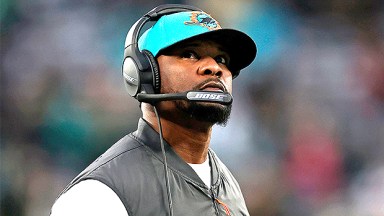
Brian Flores, 40, filed a lawsuit to sue the NFL along with the Miami Dolphins, Denver Broncos, and New York Giants on Tuesday February 1. The former Dolphins head coach alleged that he’d been a victim of racial discrimination during the hiring process during his career in the new legal documents filed in a Manhattan federal court. Here are five things you need to know about Brian and his lawsuit here.

1. Brian alleged that he was unjustly fired from the Dolphins.
Brian was the head coach of the Miami Dolphins from 2019 to 2021. He alleged that Dolphins owner Stephen Ross had offered him an additional $100,000 for each game his team lost to help get a better position for the draft, per ESPN. As the team started winning, Stephen got angry that the team wouldn’t get the draft pick that he was looking for. The owner also invited him to a lunch meeting on his yacht to have an impromptu conversation with a quarterback, but Brian refused and left. The lawsuit claims that he was treated as “someone who was noncompliant and difficult to work with.”
The lawsuit points out that the Dolphins had winning records for two seasons in a row under Brian’s coaching, and it said that the reason he was fired before his five-year contract was up was because of “poor collaboration,” and said that the reasoning had “discriminatory undertones.”
2. He cited the Rooney Rule and called out teams for racist practices.
The lawsuit also got into an interview that Brian had set up with the Giants for a head coaching position. The filing explains that Brian had an interview schedule with the New York team in January 2022, and he’d texted New England Patriots Head Coach Bill Belichick about the job. The Patriots coach had told Brian that he was “their guy,” but then later explained that he’d misread a text, and that Brian Daboll was actually being named as the head coach.
The lawsuit pointed towards the Rooney Rule, an NFL policy that requires teams to interview at least one minority candidate for open head coaching positions. “Mr. Flores was deceptively lead to believe that he actually had a chance at this [Giants head coaching] job,” the lawsuit says. The lawsuit claims that the Rooney Rule, while “well intentioned” is “not working,” as demonstrated by the disparity in the number of Black players versus Black coaches and coordinators.
3. He is trying to get the NFL to hire more Black coaches.
Besides the money, Brian also wants the NFL to change policies as a result of the lawsuit. He sought asked for Black members of the organizations to have more “influence” on the decisions to hire and fire people in leadership positions like head coaches and general managers. He also called for more objectivity in the hiring and firing process, as well as more Black offensive and defensive coordinators.
4. He coached with the New England Patriots, before going to Miami.
Before taking the head coaching position with the Dolphins, Brian was involved with the Patriots as early as 2004. He started his career as a scouting assistant, before joining the coaching staff as a special teams assistant in 2008. His final years with the Pats, he was a safeties coach from 2012 to 2015, and he was a linebackers coach from 2016 to 2018, before he took the head coaching job with the Dolphins. He was with the Pats through four of their Super Bowl championships.

5. He played college football.
Before becoming a prominent coach in the NFL, Brian was a linebacker for Boston College from 1999 to 2003, per ESPN. He was the second-leading tackler, and he likely would’ve gone on to play in the NFL himself if it wasn’t for a torn quadriceps muscle, which put his playing career to rest, but he was able to secure a job with the Patriots.


